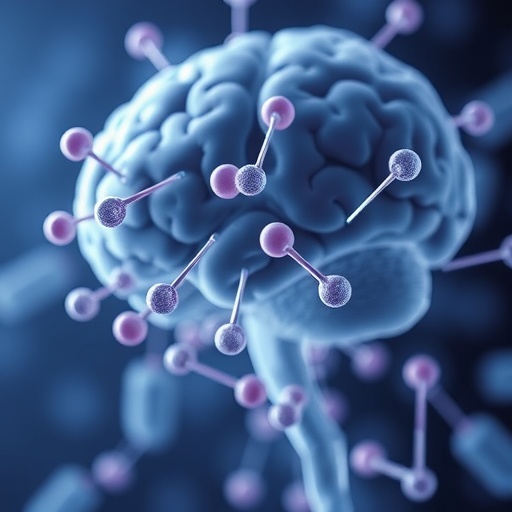Recent research has spotlighted the significant role of cell communication in mediating various physiological and pathological processes. A pivotal study conducted by Arvola et al., published in the esteemed journal BMC Neuroscience, investigates the impact of exosomes derived from neural progenitor cells on ischemia/reperfusion injury within cardiomyoblasts. This research opens new avenues for understanding cellular interactions and offers innovative therapeutic strategies for cardiovascular diseases.
Exosomes are small extracellular vesicles that facilitate intercellular communication and transport biomolecules such as proteins, lipids, and RNAs. Their capacity to encapsulate functional proteins and genetic material has garnered attention from the scientific community, positioning them at the forefront of modern cellular biology. These vesicles are crucial for the maintenance of cellular homeostasis and have a profound impact on a variety of biological processes, ranging from development to immune response.
The phenomenon of ischemia/reperfusion injury is characterized by the damage that occurs when blood supply returns to tissue after a period of oxygen deprivation. This complex process involves a cascade of cellular stress responses that can culminate in cell death and tissue damage. In the context of cardiac tissue, ischemia/reperfusion events can lead to significant cardiomyocyte loss, which severely compromises cardiac function. Given these dire implications, unraveling the therapeutic potential of exosomes from neural progenitor cells presents an exciting frontier.
Neural progenitor cells are a unique class of stem cells with the ability to differentiate into various neural lineages. The exosomes released from these cells are believed to carry factors that can modulate the cellular environment and promote tissue repair. In their study, Arvola and colleagues specifically focused on how these exosomes can influence cardiomyoblasts subjected to ischemic stress, aiming to delineate the underlying molecular mechanisms involved.
The researchers employed a well-characterized model of ischemia/reperfusion injury in cardiomyoblasts to assess the effects of neural progenitor cell-derived exosomes. They meticulously evaluated the cellular responses to the exosome treatment, measuring key indicators of cell viability, apoptosis, and cardiac-specific gene expression. Their findings revealed a profound protective effect of these exosomes in preserving cardiomyocyte survival under ischemic conditions.
At the core of this protective mechanism are various bioactive molecules encapsulated within the exosomes, including growth factors and microRNAs. These components have demonstrated the ability to regenerate damaged tissues and enhance cell survival, suggesting that they play a significant role in mediating the adaptive responses of cardiomyoblasts during stress. Exosome-mediated signaling pathways activate cellular defenses against oxidative stress and apoptosis, reinforcing the notion that these vesicles serve as pivotal mediators of tissue recovery.
The significance of the study lies not only in the observed protective effects of neural progenitor cell-derived exosomes but also in their potential application in regenerative medicine. The ability to harness these exosomes as therapeutic agents offers a promising strategy for protecting cardiac tissue from ischemic injury. This innovative approach could usher in a new era of treatments aimed at mitigating damage and promoting healing in heart disease.
The authors also acknowledged the challenges that lie ahead in translating these findings into clinical practice. The isolation and characterization of exosomes for therapeutic use require meticulous optimization to ensure safety and efficacy. Moreover, understanding the biodistribution, pharmacokinetics, and immunogenicity of these nanoparticles will be essential in facilitating their application in human patients.
Future research must also address the broader implications of exosome therapy beyond cardiac applications. The findings presented by Arvola et al. provide a template for investigating the role of exosomes in other forms of ischemic injuries, including those affecting the brain and peripheral tissues. Exploring these avenues could unveil a myriad of therapeutic applications, ultimately enhancing the scope of regenerative medicine.
In conclusion, the study conducted by Arvola and colleagues underscores the transformative potential of neural progenitor cell-derived exosomes in combating ischemia/reperfusion injury in cardiomyoblasts. Their research not only contributes to our understanding of cardiac repair mechanisms but also sets the stage for future clinical applications that may revolutionize how we approach myocardial ischemia. As the scientific community continues to unravel the complex roles of exosomes in cellular biology, the pursuit of exosome-based therapies promises to be a pivotal frontier in regenerative medicine.
The exploration of exosome-mediated signaling pathways paves the way for innovative strategies to enhance tissue resilience against ischemic insults. With ongoing advancements in exosome research, we stand at the threshold of a new paradigm in treating cardiovascular diseases, where harnessing the innate healing properties of exosomal cargo could drastically improve patient outcomes. Ultimately, the work of Arvola et al. signifies a crucial step toward integrating this knowledge into real-world applications, further bridging the gap between experimental findings and clinical practice.
As this area of research develops, interdisciplinary collaborations between biologists, clinicians, and engineers will be imperative. The synergy between these fields may accelerate the translation of preclinical discoveries into novel therapeutic modalities. With increased investment and focus on exosomal research, it is likely that we will witness groundbreaking advancements that could realign our approach to tackling ischemic heart disease and its repercussions.
Subject of Research: Exosomes derived from neural progenitor cells and their effect on ischemia/reperfusion injury in cardiomyoblasts.
Article Title: Neural progenitor cell-derived exosomes in ischemia/reperfusion injury in cardiomyoblasts.
Article References:
Arvola, O., Stigzelius, V., Ampuja, M. et al. Neural progenitor cell-derived exosomes in ischemia/reperfusion injury in cardiomyoblasts.
BMC Neurosci 26, 11 (2025). https://doi.org/10.1186/s12868-025-00931-1
Image Credits: AI Generated
DOI: 10.1186/s12868-025-00931-1
Keywords: exosomes, neural progenitor cells, ischemia/reperfusion injury, cardiomyoblasts, regenerative medicine.




